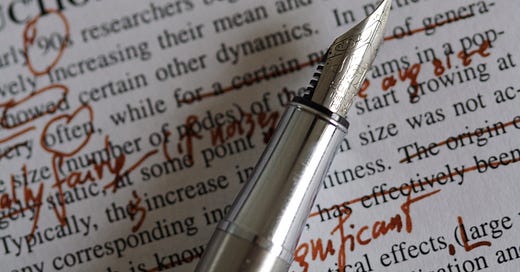Recently I started an editing job. I’ve been freelance developmental editing for years, but I really wanted to land a position that didn’t require me to find the clients. The hustle of freelancing is exhausting and I just wanted a regular job in publishing. I got sort of a hybrid version of regular. I’m still an independent contractor, but the group I’m working for brings in the clients, taking a lot of the pressure off me and allowing me to have a second contracted job as a marketing assistant. (And theoretically keep writing, but I’m not doing much of that right now.) And I love it. I love both jobs, but I’m talking about the editing role right now. Just like the MFA program I teach in from time to time, it’s a coaching process and an editing process, both of which I really enjoy.
But it’s funny, isn’t it, that there’s always something involved with the Work that gets under your skin. I mean this lightly, because it’s not a big deal and it’s my job to fix these little things, but sometimes the little things grow into giant thorns in my heel and I just want to say to a writer “STOP DOING THAT!” (And let me assure you I’m positive I make the same exact mistakes in my own writing! This is not meant to be a self-righteous rant. We are not our own best editors and this is why you should always hire someone if you’re not going the traditional route.)
Lately the thorn has been dialogue. Or rather the way in which someone orders the words with the action or emotion behind it. The best way to explain this is just to give you an example:
“It won’t fit!” she yelled. Bella tried to shove her foot into the too-small boot.
That’s a fine enough line. However, if you read it closely—by this I mean study the arrangement of words—the error is in the order of things. One doesn’t typically yell that something doesn’t fit before they try it on. So a better line is:
Bella tried to shove her foot into the too-small boot. “It won’t fit!” she yelled.
It might seem like I’m being overly picky. I mean, sure, maybe Bella has tried a few times and keeps trying and keeps yelling it won’t fit out of frustration. Kids do that, for sure. (In fact, my youngest did that so often, insisting it would fit if he just kept shoving, he’d end up biting his shoe because he was so mad. Story for another time.) But the incorrect ordering of events/speech tends to be a pattern for some writers so that down an entire page people are speaking before they think, act, or sometimes even see the object or subject of their speech. This is not how humans behave. We react, or speak as in this case, after something is revealed.
Another example of the incorrect order of things without dialogue, which I also see a lot:
Bella jumped. A spider fell from the ceiling and landed on her shoulder.
Sometimes there’s a tendency to put what we think is the more active or tense moment first—Bella jumping. But this line is explaining the action after the fact and so it actually loses its tension. A better way to write this would be:
Something soft, but heavy suddenly plopped on Bella’s shoulder. She squeezed her eyes shut and then dared to peek. A spider!
Here you don’t even need to say Bella jumped. It’s implied in the exclamation point. And I’m no Hemingway, but simply by using stronger language you can convey the unexpected horror in the logical order it would occur.
Obviously there are times when speaking is supposed to come before action. This isn’t a blanket rule for all dialogue, it’s simply something to be aware of when you’re writing to make sure you’re using logic just as much as your imagination.
Also, by mixing it up, you create a more dynamic scene. Often when I see the pattern of speech before actions, not only is it done illogically, it’s done constantly so that every single line of dialogue begins with the character speaking. Then it becomes distracting and takes away from the story. Change it up! Sometimes start with actions, sometimes with interior thought, and sometimes with words. Just make sure the order of things makes sense.
Next book you read, take a deeper look at how the writer has varied and balanced the characters’ speech with everything else going on in the scene. And next time you write a scene, look closely at your arrangement of words. It’s a small issue that can grow into a huge problem.
Happy Writing and watch out for those spiders!
~J





Are you too picky? No. I would have removed “she yelled” too. 😂